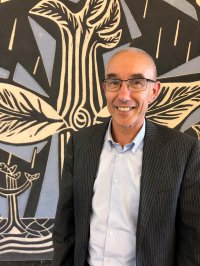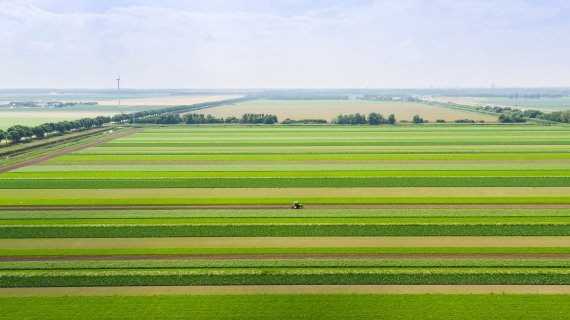The Agroecology and Technology Test Location was opened in Lelystad last year. Here, WUR and farmers doe research on more sustainable farming methods such as strip cultivation.
text Albert Sikkema photo ERF bv
The vision on circular agriculture which Minister of Agriculture, Nature and Food Quality (LNV) Carola Schouten announced last year is gradually taking shape. The minister recently presented an implementation plan for circular agriculture and her ministry published a Knowledge and Innovation Agenda to go with it.
As director of ‘Agro and Nature Knowledge’ in the last few years, Michel Berkelmans has been responsible for the ministry’s research and innovation policy. On his last working day in this job, he explains the broad lines of the Knowledge Agenda. This month he takes up a new position as manager of Circular Agriculture Experiments, leading five ‘living labs’ for the ministry, where the principles of circular agriculture will be put into practice.

‘We must take new steps, and not keep on doing what we’ve always done.’ – Michel Berkelmans, ministry of LNV
What is new about this Knowledge and Innovation Agenda?
‘This is the first knowledge agenda in which we take an integrated look at our food system, with the aim of plugging into the forces at work in society and the practical expertise on farms. It is a strategic document, based on the view that competing on cost price is no longer viable, and that we must cut down our use of resources. Transitions are needed, so we are investing in ‘living labs’ to make the shift together towards circular agriculture.
This is really different to the way it was six years ago, when I started at the ministry in my present role. Then we were working on legislation and instruments for optimizing parts of the whole. Now we set overall goals: we say what we aim to achieve and look for legislation that will support us in finding new solutions. It is a quest: you win some and you lose some, and learn as you go along. That is why in our knowledge policy we deliberately link up with practitioners in the various regions and on farms.’Are you going to shape the knowledge policy in the regions? ‘I’m going to get to work in the five ‘living labs’ for circular agriculture in the north of the country, the Achterhoek in the east, Flevoland, De Peel and the ‘Green Heart’. I want to find out what problems the promising initiatives in the sector are encountering. Sometimes regulations and policy pose a problem, and in that case I will get back to the policymakers. Perhaps we can solve those stumbling blocks.’Haven’t those stumbling blocks in circular agriculture been addressed by innovative farmers in recent years? ‘A lot of the stumbling blocks have been addressed, but it is difficult to resolve them. Often there is no single solution because the right approach depends on the farm and the region. I want to start by really listening and getting clear where the rules and regulations are a hindrance. For example, farmers want to improve soil fertility but have to comply with a manure policy that sometimes obstructs precision fertilization. A lot of thought has gone into that manure policy and it serves environmental objectives, but it could then stand in the way of circular agriculture practices.’The Knowledge Agenda includes a small map of a patchwork of circular initiatives: living labs, test locations and local cooperatives. How linked are all these initiatives? ‘There is a lot of dynamism and energy in the living labs; that is a great development. Farmers, water boards and nature organizations are joining forces, often with the provincial and municipal councils too. The farmers make their own choices, depending on their farm and environment, so you get region-specific approaches. Ultimately, we want to spread the experiences in the regions more broadly to other initiatives, so there is an exchange of knowledge between the test locations and the living labs. We still need to make some progress on that.’What do you expect of WUR? ‘What I expect of WUR is that it contributes expertise to support the transition to circular agriculture, in terms of both practice and process. I also expect the living labs to generate knowledge and innovations that WUR can make use of in its education and its research. We must strengthen the interaction between farmers and researchers, and the initiative for that needs to come from both sides.’The role of WUR is under discussion. Some think it is a monopolist, while others say WUR is not visible enough in the agriculture sector. What’s your take on WUR? ‘To start with: in all the rankings, WUR is in the top three at least. WUR is a top institution, and one we sorely need. But it is not our only knowledge partner. The idea that it is a monopolist might have something to do with Wageningen Research finally getting extra funding from this cabinet to strengthen its knowledge base, after years of budget cuts. I’m pleased about that, because the foundations of our knowledge system were collapsing. And there are always parties that don’t get funding and are disappointed, but Wageningen Research does not have a monopoly. We contract assignments out to other organizations as well.
I also think WUR should join forces with other parties more than it does, because the issues around the transition are extremely broad. But my main advice to WUR is to think hard first. We are in a process of transition and that means rethinking your own organization. A quest for a new food system is not the same as introducing innovation in the existing system. This kind of change takes years and a process plan. WUR has to make this change just like the ministry of LNV, so that Wageningen can help us during the food transition. So we must take new steps, and not keep on doing what we’ve always done. I can see that reflected in WUR’s new strategic plan, so this is not a criticism. But it is important to realize that the transition to circular agriculture affects WUR as well. The time has come to put this into practice.’Should WUR be offering farmers new business models? ‘The demand for new business models comes mainly from the unequal position of farmers in the food supply chain, as a result of which they get low prices. And from the quest for remuneration for added value. I am seeing all kinds of initiatives with specific business models across the sector, and I think it would be interesting to study those: what makes these farmers successful? And can it be upscaled? I think WUR – just like the ministry – can learn a lot from practitioners.’

